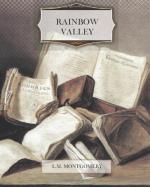CHAPTER XIII. THE HOUSE ON THE HILL
There was a little unfailing spring, always icy cold and crystal pure, in a certain birch-screened hollow of Rainbow Valley in the lower corner near the marsh. Not a great many people knew of its existence. The manse and Ingleside children knew, of course, as they knew everything else about the magic valley. Occasionally they went there to get a drink, and it figured in many of their plays as a fountain of old romance. Anne knew of it and loved it because it somehow reminded her of the beloved Dryad’s Bubble at Green Gables. Rosemary West knew of it; it was her fountain of romance, too. Eighteen years ago she had sat behind it one spring twilight and heard young Martin Crawford stammer out a confession of fervent, boyish love. She had whispered her own secret in return, and they had kissed and promised by the wild wood spring. They had never stood together by it again—Martin had sailed on his fatal voyage soon after; but to Rosemary West it was always a sacred spot, hallowed by that immortal hour of youth and love. Whenever she passed near it she turned aside to hold a secret tryst with an old dream—a dream from which the pain had long gone, leaving only its unforgettable sweetness.
The spring was a hidden thing. You might have passed within ten feet of it and never have suspected its existence. Two generations past a huge old pine had fallen almost across it. Nothing was left of the tree but its crumbling trunk out of which the ferns grew thickly, making a green roof and a lacy screen for the water. A maple-tree grew beside it with a curiously gnarled and twisted trunk, creeping along the ground for a little way before shooting up into the air, and so forming a quaint seat; and September had flung a scarf of pale smoke-blue asters around the hollow.
John Meredith, taking the cross-lots road through Rainbow Valley on his way home from some pastoral visitations around the Harbour head one evening, turned aside to drink of the little spring. Walter Blythe had shown it to him one afternoon only a few days before, and they had had a long talk together on the maple seat. John Meredith, under all his shyness and aloofness, had the heart of a boy. He had been called Jack in his youth, though nobody in Glen St. Mary would ever have believed it. Walter and he had taken to each other and had talked unreservedly. Mr. Meredith found his way into some sealed and sacred chambers of the lad’s soul wherein not even Di had ever looked. They were to be chums from that friendly hour and Walter knew that he would never be frightened of the minister again.
“I never believed before that it was possible to get really acquainted with a minister,” he told his mother that night.
John Meredith drank from his slender white hand, whose grip of steel always surprised people who were unacquainted with it, and then sat down on the maple seat. He was in no hurry to go home; this was a beautiful spot and he was mentally weary after a round of rather uninspiring conversations with many good and stupid people. The moon was rising. Rainbow Valley was wind-haunted and star-sentinelled only where he was, but afar from the upper end came the gay notes of children’s laughter and voices.




